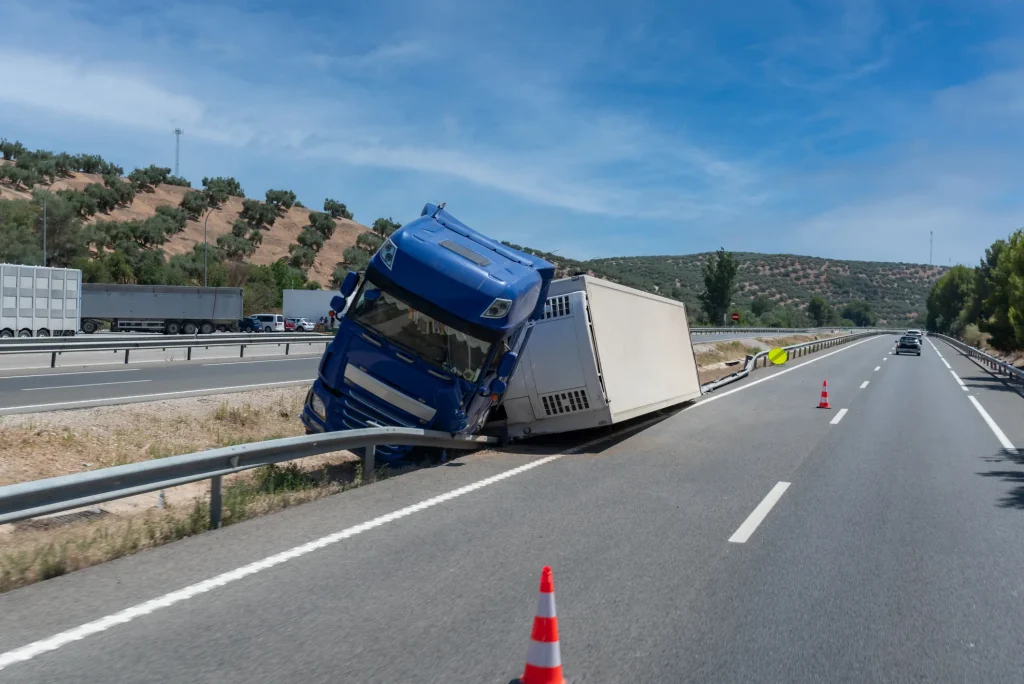Evidence in a Trucking Accident in Colorado

Receiving justice in a truck accident can only be achieved by collecting the proper evidence. Producing evidence will show who was liable for the crash as well as proving the injuries that were sustained. Trucking accidents in Colorado can be complex due to the numerous parties involved, including the truck driver, trucking company, and possibly manufacturers. In this article, we’ll go over the importance of evidence in trucking accidents, what are common pieces of evidence cited in cases, and how they can be preserved.
The Importance of Evidence in Trucking Accidents
Evidence plays a starring role in trucking accident cases. Establishing fault and demonstrating the extent of damages is their ultimate purpose. Unlike typical car accidents, truck accidents often involve larger vehicles and more regulations, meaning there are more factors to consider when an accident occurs. Gathering the right evidence helps build a solid case and can influence whether your claim is settled out of court or goes to trial. Common types of evidence used in trucking accidents in Colorado are often the following.
Drivers Electronic Logbook
One of the most important pieces of evidence in a trucking accident is the driver’s electronic logbook, also known as an electronic logging device (ELD). This device tracks the truck’s driving hours, speed, and rest periods. It can show whether the driver was complying with federal hours-of-service regulations or if they were driving beyond legal limits. In Colorado, trucking companies are required to maintain these records.
Black Box Data from the Truck
Modern trucks are equipped with event data recorders, often referred to as black boxes. These devices capture data such as speed, braking patterns, and even GPS location before, during, and after an accident. This data can provide valuable insights into the truck’s performance and the driver’s actions leading up to the accident.
Pictures Taken at the Scene of the Accident
Unsurprisingly, photographs of the accident scene are essential. They help document the position of vehicles, road conditions, and any visible damages to the vehicles. Taking pictures from various angles and distances to capture a comprehensive view of the scene is vital during accident cases. These photos can help recreate the accident’s dynamics and establish how the collision occurred.
Witness Statements
Eyewitnesses can offer valuable perspectives on the accident. Statements from people who saw the crash or were near the scene can provide additional context and corroborate your version of events. Collect contact information from witnesses and ensure their statements are recorded as soon as possible after the accident.
Truck Maintenance Records
Maintenance records of the truck can reveal whether the vehicle was properly maintained and if any mechanical failures contributed to the accident. Trucking companies are required to keep detailed maintenance logs, and these records can show if any issues, such as brake failures or tire blowouts, were present.
Employment Records of the Driver
The driver’s employment records can provide insight into their driving history and qualifications. This includes information on training, previous accidents, and any disciplinary actions taken against them. These records can help establish whether the driver was properly qualified and whether their past behavior might have contributed to the accident.
Police Reports
A police report is a key piece of evidence that provides an official account of the accident. It typically includes details such as the date and time of the accident, the parties involved, and initial findings of fault. While a police report can be a strong piece of evidence, it’s important to remember that it’s not always definitive in determining liability.
Medical Records
Medical records document the injuries sustained in the accident and the treatment received. These records are crucial for proving the extent of injuries sustained during the accident and the impact on the lives of those involved. They also help establish a connection between the accident and injuries, which is essential for securing compensation.
How to Preserve Evidence
Preserving evidence is just as important as collecting it. Here are some tips to ensure your evidence remains intact:
Gather Evidence as Soon as Possible
Evidence can deteriorate over time, so it’s important to gather it as soon as possible after the accident. This is why we recommend collecting witness records and taking photographs of the accident scene immediately. The scene can become contaminated quickly and eyewitness reports can be altered by the influence of others, or through misremembering details after time has passed. Be sure to gather evidence as soon as possible so there is a clear understanding of what happened before anything is altered.
Secure Digital Evidence
Ensure that electronic evidence, such as data from ELDs or black boxes, is secured and backed up to prevent tampering or loss. These pieces of evidence are crucial in a trucking accident case in Colorado. Having them secured and safe is very important for preserving evidence.
Work and Consult with Professionals
Work with accident reconstruction experts or forensic professionals if needed. They can help analyze complex evidence and provide expert testimony if your case goes to trial.
Evidence Preservation Letter
This formal request is sent to the involved parties, such as the trucking company or their insurers, to ensure that all relevant evidence related to the incident is preserved and not destroyed or altered. The letter is usually sent by an attorney and outlines the specific types of evidence that need to be maintained, such as vehicle data, driver logs, and maintenance records. By sending an evidence preservation letter, you formally alert the parties of their obligation to safeguard critical information, which can help strengthen your case and prevent potential disputes over lost or tampered evidence. In some cases, judges will sanction a truck driver/trucking company for failing to preserve evidence. This sanction can include attorney fees, ordering the jury to make a negative inference against the trucking company, or even disallowing the trucking company to assert certain legal arguments.
If you’ve been involved in a trucking accident and need assistance with gathering and analyzing evidence, the team at Hoffman Law Firm PC is here to help. Contact us to discuss your case and find out how we can assist you in navigating the complexities of a trucking accident claim.
